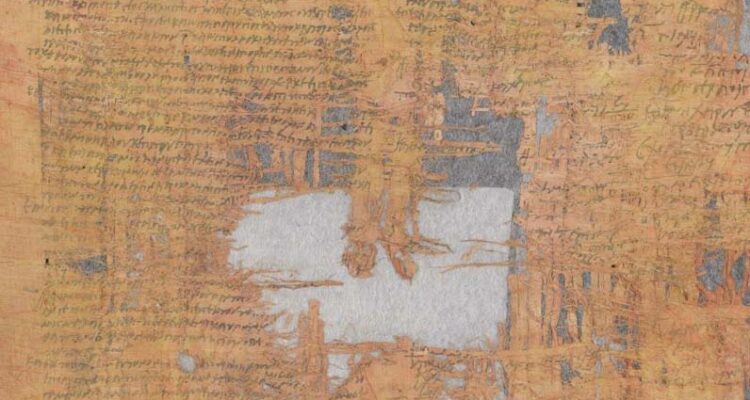Dr. Avner Eckner of the Hebrew University suggested that the two defendants were either engaged in evading Roman taxes or possibly fulfilling a biblical duty to redeem enslaved Jews.
By Pesach Benson, TPS
A newly analyzed papyrus has unveiled a spectacular case of forgery and fiscal fraud in the Roman Empire, providing scholars with rare insight into the legal and administrative workings of the imperial state.
Discovered among the collections of the Israel Antiquities Authority and recently published in the international scholarly journal Tyche, the document details a financial crime involving tax fraud and the illegal sale and manumission of slaves in the Roman provinces of Judea and Arabia.
The case, which took place against the backdrop of political unrest in the region, offers a direct look at Roman jurisdiction, legal practice, and the turbulent relationship between the empire and its subjects.
The Greek-language papyrus, the longest ever found in the Judean Desert with over 133 lines of text, had remained unnoticed for decades after being misclassified as Nabataean.
Its significance came to light in 2014 when Professor Hannah Cotton-Paltiel of the Hebrew University of Jerusalem rediscovered it while organizing documentary papyri at the Israel Antiquities Authority’s scrolls laboratory.
Upon realizing the misclassification, Cotton-Paltiel exclaimed, “It’s Greek to me!” In recognition of her role in its rediscovery, the document has been named P. Cotton in line with papyrological conventions.
Understanding the importance of the document, she assembled a team of scholars from the Austrian Academy of Sciences, the University of Vienna, and the Hebrew University of Jerusalem to decipher the text.
They determined that the papyrus contained notes from prosecutors preparing for a trial before Roman officials on the eve of the Bar Kochba revolt (132–136 CE).
The text includes a draft transcript of the judicial hearing itself, making it a rare and valuable source for understanding Roman legal procedures. The language is strikingly direct, capturing exchanges between prosecutors as they strategized and assessed evidence.
“This papyrus is extraordinary because it provides direct insight into trial preparations in this part of the Roman Empire,” said Dr. Anna Dolganov of the Austrian Academy of Sciences.
The case revolves around two defendants, Gadalias and Saulos, who were accused of tax evasion and document forgery.
Gadalias, the son of a notary and possibly a Roman citizen, had a history of criminal activities, including counterfeiting, extortion, and inciting rebellion. Saulos, his accomplice, orchestrated fraudulent transactions with forged documents involving the selling and freeing of slaves.
“Freeing slaves does not appear to be a profitable business model,” said Dr. Avner Eckner of Hebrew University, suggesting that the two were either engaged in evading Roman taxes or possibly fulfilling a Biblical duty to redeem enslaved Jews.
Said Dolganov, “Forgery and tax fraud carried severe penalties under Roman law, including hard labor or even capital punishment.”
The historical context surrounding the case adds another layer of intrigue.
The trial took place between two significant Jewish revolts against Roman rule: the Jewish Diaspora revolt (115–117 CE) and the Bar Kochba revolt (132–136 CE). The text suggests that Gadalias and Saulos may have been involved in rebellious activities during Emperor Hadrian’s visit to the region in 129–130 CE. Their case also names Tineius Rufus, the governor of Judea at the time the Bar Kochba revolt erupted, suggesting that Roman authorities were deeply concerned about the implications of their actions.
“Whether they were indeed involved in rebellion remains an open question, but the insinuation speaks to the charged atmosphere of the time,” explained Dolganov.
Beyond its historical and political implications, the papyrus sheds new light on Roman law in the Greek-speaking eastern empire. It references the governor’s assize tour of his province to hear legal cases and administer justice. The reference to compulsory jury service confirms that legal institutions known from Egypt were also in effect in other provinces.
“This document shows that core Roman institutions documented in Egypt were also implemented throughout the empire,” noted Prof. Fritz Mitthof of the University of Vienna. Additionally, the papyrus highlights the Roman state’s ability to regulate private transactions even in the empire’s distant regions.
The outcome of the trial may have been disrupted by the rebellion, leaving unanswered questions about the fate of the accused, the researchers said. The document was likely hidden in a cave in the Judaean Desert during the Bar Kochba revolt.





